Related Research Articles
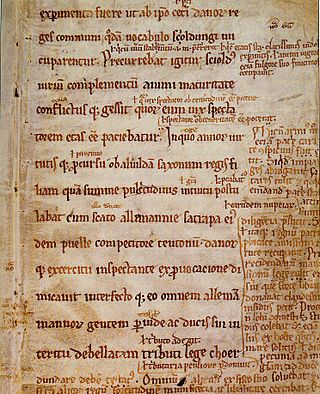
Gesta Danorum is a patriotic work of Danish history, by the 12th-century author Saxo Grammaticus. It is the most ambitious literary undertaking of medieval Denmark and is an essential source for the nation's early history. It is also one of the oldest known written documents about the history of Estonia and Latvia.
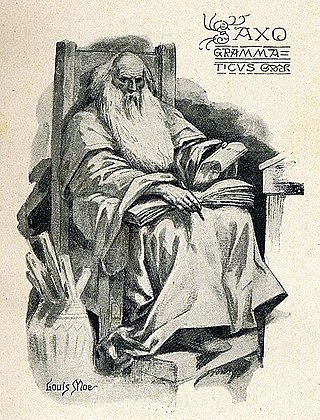
Saxo Grammaticus, also known as Saxo cognomine Longus, was a Danish historian, theologian and author. He is thought to have been a clerk or secretary to Absalon, Archbishop of Lund, the main advisor to Valdemar I of Denmark. He is the author of the Gesta Danorum, the first full history of Denmark, from which the legend of Amleth would come to inspire the story of Hamlet by Shakespeare.

Lotherus (Lother) was one of the earliest kings of Denmark according to Saxo Grammaticus's Gesta Danorum.
Chronicon Lethrense is a small Danish medieval work from the late 12th century, written in Latin.
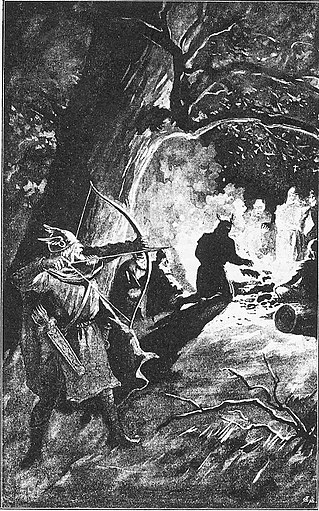
Palnatoke or Palnatoki, sometimes written Palna-Toki or Palna Toki, was a legendary Danish hero and chieftain of the island of Fyn. According to the Jómsvíkinga saga, Palnatoki founded the brotherhood of Jomsvikings and established its laws.

The Angers Fragment (Angersfragmentet) are four parchment pages dating from the 12th-century. They are one of the four fragments remaining of the original Gesta Danorum written by Saxo Grammaticus. This is the only fragment attested to be of Saxo's own handwriting. It consists of four pages with 8 written sides.
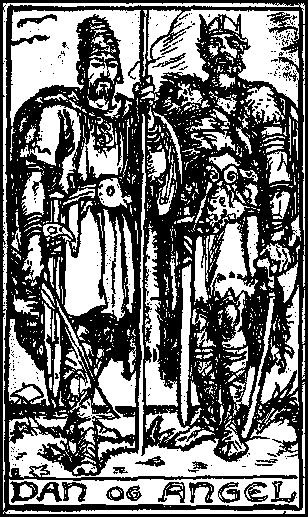
Dan I was the progenitor of the Danish royal house according to Saxo Grammaticus's Gesta Danorum. He supposedly held the lordship of Denmark along with his brother Angul, the father of the Angles in Angeln, which later formed the Anglo-Saxons in England.

Humblus was one of the earliest kings of Denmark according to Saxo Grammaticus's Gesta Danorum.

Skjöldr was among the first legendary Danish kings. He is mentioned in the Prose Edda, in Ynglinga saga, in Chronicon Lethrense, in Sven Aggesen's history, in Arngrímur Jónsson's Latin abstract of the lost Skjöldunga saga and in Saxo Grammaticus' Gesta Danorum. He also appears in the Old English poem Beowulf. The various accounts have little in common.

Gram was one of the earliest legendary Danish kings according to Saxo Grammaticus' Gesta Danorum. His history is given in more detail than those of his predecessors. Georges Dumézil argued that Gram was partially modelled on the god Thor, in particular his defeat of Hrungnir and subsequent encounter with Gróa.
Dan III is one of the legendary Danish kings described in Saxo Grammaticus' Gesta Danorum.
Frotho II is one of the legendary Danish kings described in Saxo Grammaticus' Gesta Danorum.
Frotho I is one of the legendary Danish kings in Saxo Grammaticus' Gesta Danorum, where he has a substantial biography. He succeeds his father Hadingus to the throne and replenishes the war-drained treasury by slaying a dragon and winning its treasure. He uses the money to finance expeditions into the Baltic, where he wins victories with clever strategems. After some trouble at home he campaigns successfully in Britain and captures London. He finally dies in a war against the king of Sweden.
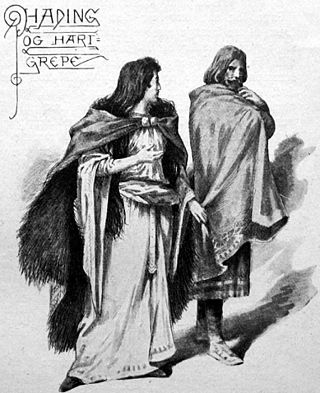
Hadingus was one of the earliest legendary Danish kings according to Saxo Grammaticus' Gesta Danorum, where he has a detailed biography. Georges Dumézil and others have argued that Hadingus was partially modelled on the god Njörðr.
Fridlevus I is one of the legendary Danish kings described in Saxo Grammaticus' Gesta Danorum.
Harðgreipr is a jötunn in Norse mythology. In Gesta Danorum, she is the daughter of the jötunn Vagnophtus and the nurse of the Danish hero Hadingus.

Angul is a figure in Nordic mythology who, according to the Gesta Danorum was the ancestor of the Danes, along with his brother Dan. He was also the ancestor of the Angles in Denmark, who later migrated to Great Britain, naming the land they settled England.
Henrik Svendsen, better known as Henrik Skadelår or Henrik the Lame, was a Danish prince and pretender through his father, Svend Tronkræver, an illegitimate son of King Sweyn II. He died in the Battle of Fotevik before he could press his claim.
Rusla, also known as the "Red Woman" from Middle Irish Ingean Ruagh, was a legendary Norwegian shield-maiden mentioned in the Gesta Danorum or "History of the Danes" of Saxo Grammaticus and in the Irish annals. According to Saxo, Rusla was the daughter of a fifth or sixth century king of Telemark called Rieg, and sister of Tesandus (Thrond), who was dispossessed of his throne by a Danish king named Omund. Rusla formed a pirate fleet to attack all Danish ships as revenge for the affront to her brother. Rusla was always accompanied by another woman, Stikla, who was her deputy in all raids. Stikla turned to piracy to avoid marriage, and her name is the origin of the Norwegian city of Stiklestad.
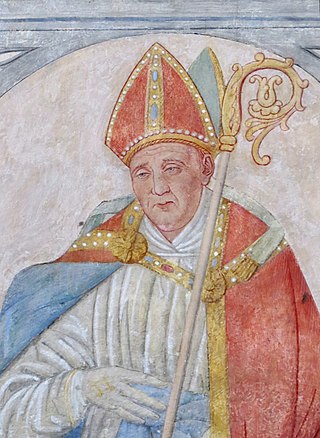
William of Roskilde was a Danish prelate of the Roman Catholic Church who served as the Bishop of Roskilde in Denmark from about 1060.
References
- Davidson, Hilda Ellis (ed.) and Peter Fisher (tr.) (1999). Saxo Grammaticus : The History of the Danes : Books I-IX. Bury St Edmunds: St Edmundsbury Press. ISBN 0-85991-502-6. First published 1979-1980.
- Elton, Oliver (tr.) (1905). The Nine Books of the Danish History of Saxo Grammaticus. New York: Norroena Society. Available online
- Olrik, J. and H. Ræder (1931). Saxo Grammaticus : Gesta Danorum. Available online